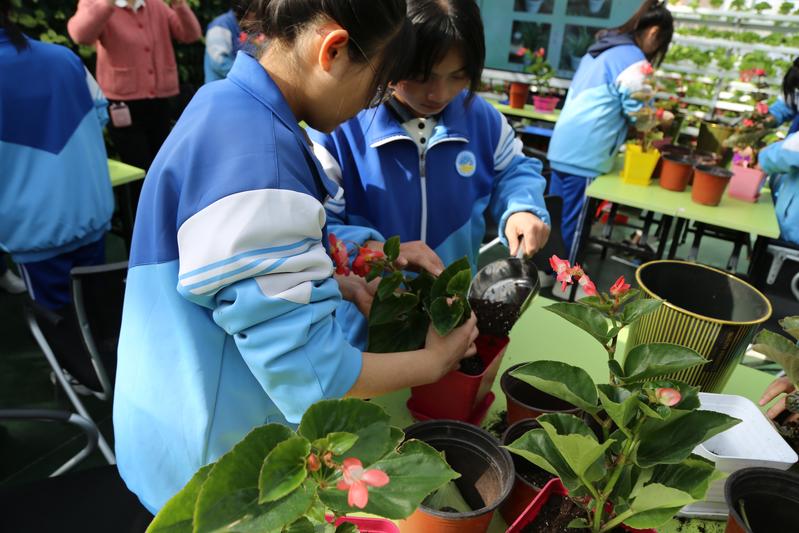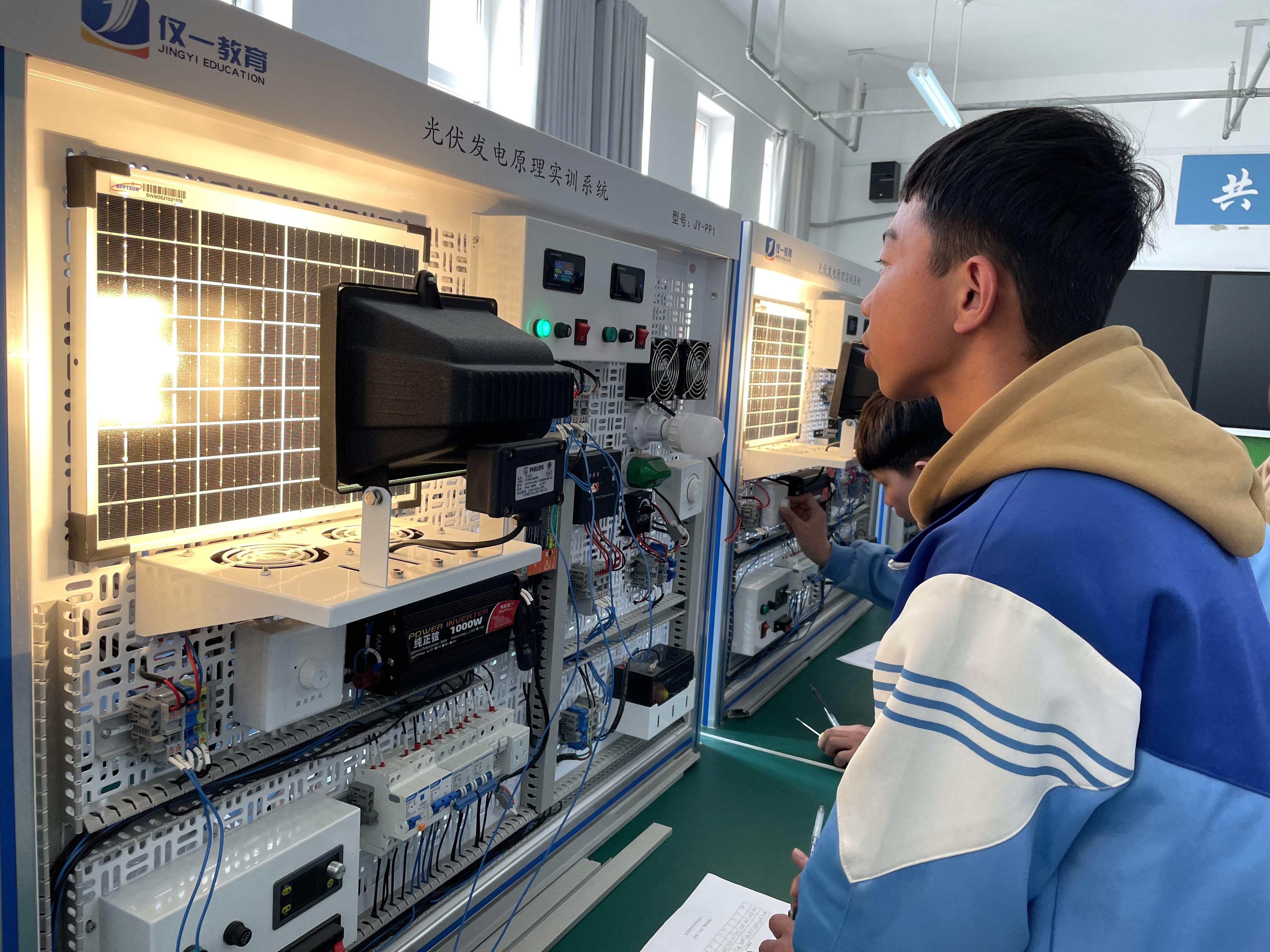Ningxia benefits as needs of local industries are met
 Students learn agricultural technology, electrical engineering and other skills at the vocational school in Hongsibu district, Wuzhong city, Ningxia Hui autonomous region. (GUO SHAOYU / FOR CHINA DAILY)
Students learn agricultural technology, electrical engineering and other skills at the vocational school in Hongsibu district, Wuzhong city, Ningxia Hui autonomous region. (GUO SHAOYU / FOR CHINA DAILY)
Ma Guopeng, 17, has produced about half a hectare of daylilies at home — earning his family more than 100,000 yuan ($14,500) last year.
This income was largely the result of the second-year high school student telling his parents when and how to properly apply fertilizer and water to the plants, which bear large yellow flowers and bloom only for a day.
Our priority is to end such views (on vocational secondary school students being inferior to those from high schools), help the students build confidence, and make them realize that they can contribute greatly to society.
Mi Zhanjun, former voca-tional school principal
Ma is studying modern protected agriculture at a vocational secondary school in Hongsibu district, Wuzhong, Ningxia Hui autonomous region.
He has made good progress since taking part in a program to learn about and optimize the planting of these lilies and help breed new varieties.
The lessons require much time and effort to be spent in a greenhouse. The students are taught to assess temperatures and humidity levels, use a wheelbarrow to spread manure, and apply drip irrigation during fieldwork.
The type of daylily Ma has produced is a popular medicinal herb used especially in southern areas of China to make soup.
In recent years, the daylily has become an agricultural mainstay in Hongsibu. In 2021, such plants grown on 5,347 hectares in the area had an output value of 545 million yuan, accounting for 30.6 percent of the district's annual agricultural output value, local government data show.
Ma is just one of the students passing on the information they acquire to their families. He said he is enthusiastic about the lessons and wants to further improve the industry.
Hongsibu is home to more than 230,000 people relocated mainly from barren areas of Xihaigu in southern Ningxia, which comprises Xiji county, Haiyuan county and Guyuan city. The UN once labeled the area the "most unfit place for human settlement" in terms of land reclamation, drought and a fragile ecological environment.
In the late 1990s, China launched an irrigation project to pump water more than 300 meters up to Hongsibu from the Yellow River.
After being lifted out of poverty in 2020, Hongsibu has made huge efforts to improve education and give the next generation more choices about future careers.
Sun Zhi, head of the region's finance department, said spending on education in Ningxia has remained above 5.4 percent of GDP for 10 consecutive years, compared with 4 percent nationally during this time.
During the COVID-19 pandemic, the general public education budget in Ningxia exceeded 20 billion yuan, accounting for one-seventh of the region's total budget spending, Sun said.
Education in Hongsibu takes up 20 percent of the district's total general public budget spending, according to local government data.
Ha Xiaojun, head of the education bureau in Hongsibu, said launching the secondary school in 2018 filled a gap in the district's vocational education, made the local education system more comprehensive, and laid a solid foundation for poverty alleviation and rural vitalization.
Student numbers at the school have risen from fewer than 300 when it was founded to about 1,600. The majority of students enter a vocational college after they graduate.
Last year, 17 graduates, mainly studying preschool education and automotive maintenance, or with a talent for sports, passed an exam for vocational school students. The exam is similar to the college entrance exam, and if they pass it, students can be admitted to university departments that emphasize practical skills for a bachelor's degree, rather than a vocational degree.
The number of such enrollments in Ningxia was around 200 last year.
 Students learn agricultural technology, electrical engineering and other skills at the vocational school in Hongsibu district, Wuzhong city, Ningxia Hui autonomous region. (GUO SHAOYU / FOR CHINA DAILY)
Students learn agricultural technology, electrical engineering and other skills at the vocational school in Hongsibu district, Wuzhong city, Ningxia Hui autonomous region. (GUO SHAOYU / FOR CHINA DAILY)
New jobs on way
In addition to modern protected agriculture, the Hongsibu vocational school offers studies in photovoltaic engineering technology and application, and wine-making technologies based on demand in local industries.
The highway between Yinchuan, capital of Ningxia, and Hongsibu is lined with wind and photovoltaic power facilities. The installed capacity of wind and photovoltaic power generation in Hongsibu accounts for nearly one-sixth the total in Ningxia.
Emerging new energy operations and the maintenance industry are likely to bring 6,000 jobs to Hongsibu by 2025, according to a Ningxia Daily report.
Guo Bo, deputy principal of the vocational school, said launching the photovoltaic engineering technology and application major in 2021 serves the development needs of local industry, which is short of talent, while helping students with internships and future employment.
The school has been in close contact with enterprises such as Hisense Hitachi Air-Conditioning Systems Co, automobile manufacturer SAIC-GM-Wuling (SGMW) and e-commerce platform JD, Guo said.
Yang Zhengxing, who graduated from the school last year, said he worked as an intern at Hisense Hitachi in Qingdao, Shandong province, in 2021, installing damping blocks in airconditioners, for which he earned about 6,000 yuan a month. He is one of more than 20 graduates from the school that year who now work at the company.
The daylily plantation program attended by Ma is part of the school's cooperation with Ningxia Rongguang Technology Group, which operates a smart agriculture business. It also sponsors facilities, consumables and seedlings needed for lessons, invites experts for lectures and training, and sends technicians to the school for tutoring sessions.
Chen Zhixiong, the school's principal, said it bridges the gap between students and industry, promotes mutual understanding, and helps employees make career choices.
Students are helped with career planning and guided in finding an occupation that matches industrial needs.
Former principal Mi Zhanjun, who helped found the school in 2018, said people have long held a stereotypical view of vocational education.
"They tend to consider vocational secondary school students as inferior to those from high schools, as they have a relatively unsatisfactory performance in the senior high school entrance examination. These vocational students also lack confidence," Mi said.
"Our priority is to end such views, help the students build confidence, and make them realize that they can contribute greatly to society."
Many of these students have clear, practical ideas about their future.
Wang Lijun, 15, who is studying mechatronics, which combines electronics and mechanical engineering, said his parents are delighted he can now solve electrical problems at home. Wang wants to apply for a job with State Grid.
Hu Tao, 17, one of the first students at the school to take the photovoltaic engineering major, said he carried out research himself and consulted friends before deciding to study new energy.
 Students learn agricultural technology, electrical engineering and other skills at the vocational school in Hongsibu district, Wuzhong city, Ningxia Hui autonomous region. (GUO SHAOYU / FOR CHINA DAILY)
Students learn agricultural technology, electrical engineering and other skills at the vocational school in Hongsibu district, Wuzhong city, Ningxia Hui autonomous region. (GUO SHAOYU / FOR CHINA DAILY)
Cooperation project
Chen, who comes from Quanzhou, Fujian province, has been in his post for three years as part of a cooperation project.
Launched by the central government last year, the project has mobilized 247 experienced school leaders from eight eastern provinces, who take a team of four or five to 160 county-level administrations in West China to improve the quality of education.
Now in their second semester in Ningxia, Chen and four colleagues from Quanzhou feel they are shouldering a heavy responsibility, as vocational education in Hongsibu is still in the early stages.
Chen said the students have relatively poor academic backgrounds compared with their counterparts in Quanzhou, who benefit from a better economy and development of vocational education.
The average age of the 140 or so teachers at the Hongsibu school is just 32, with some being transferred from high schools, and others recruited immediately after graduation.
Chen emphasizes the need to improve the teachers' capabilities and deepen their understanding of vocational education by enhancing exchanges.
Apart from sending a dozen teachers to his school in Quanzhou for learning and training every semester, he invites colleagues from Quanzhou to visit Ningxia to offer short-term support.
A total of six department heads and experienced teachers are currently at the Hongsibu school for a two-month program.
They not only give demonstration lessons, but more important, provide advice on building a scientific, flexible curriculum and management system for various departments.
Unlike volunteer teaching programs commonly seen in rural areas of China, Chen thinks the participation of school leaders in a cooperation project due to last more than a decade will make it easier to mobilize resources, which will hopefully result in changes to the educational system.
While strengthening moral and behavioral guidance for its students, the school also sent eight of them to Quanzhou recently for a month of intensive training in industrial design and the internet of things.
These students are expected to share their experiences with classmates and attend skills competitions.
"A quality education is all about accumulation. It takes time," Chen said.
During this year's two sessions, which closed on March 13, Ma Zongbao, vice-chairman of Ningxia Hui autonomous region and a member of the 14th National Committee of the Chinese People's Political Consultative Conference, called for the coordinated development of vocational education in western China.
He said this region has expanded vocational education and largely improved educational quality. It has also established a vocational education system in line with the development of industries in the area.
However, there is still a disparity with counterparts in central and eastern regions, and it will take time to meet the requirements of major national strategies, Ma said.
Undergraduate-level vocational colleges have yet to be established in Ningxia, Tibet autonomous region, and Qinghai province, Ma added.
He suggested that support be strengthened and priority given to distributing resources to improve vocational education in western areas of the country.
Cross-regional exchanges should be promoted, as well as cooperation between vocational schools, research institutions and enterprises, Ma added.
Contact the writers at fangaiqing@chinadaily.com.cn


